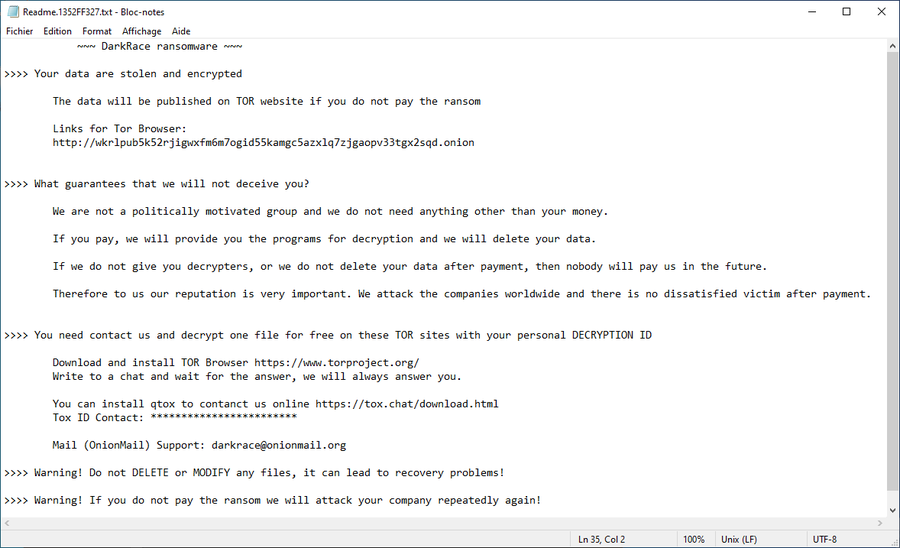Darkrace ransomware group has claimed responsibility for the hep Global data breach, listing the German renewable energy company as its latest victim.
The group claimed to have accessed hep Global’s internal systems, compromising sensitive information such as invoices, passports, and payroll details.
“Darkrace #ransomware group has added hep Global (http://hep.global) to their victim list. The provided sample contains invoices, passports, payroll details, etc., tweeted threat intelligence service Falcon Feeds.
hep Global data breach: Is it legit?
hep Global, an established player in the renewable energy industry, has been at the forefront of developing innovative solutions to combat climate change.
With a strong customer base and a global presence, hep Global has consistently delivered sustainable energy solutions while adhering to stringent data security protocols.
However, the recent hep Global data breach claim risks the company’s data to a very big extent.
The Darkrace ransomware group is a new player in the underground market. This insidious malware was discovered by S!Ri, and is known for adding a distinct extension (“.1352FF327”) to the end of each filename.

As if that weren’t enough, DarkRace creates a malitext file, housing a dreaded ransom note called “Readme.1352FF327.txt”, reported PCrisk.
The Cyber Express team contacted hep Global to confirm the data breach. However, at the time of writing this, an official response or statements have yet to be released by the company.
The hep Global data breach, at this time, is left unconfirmed. However, the threat actor in this incident asserted that they have successfully infiltrated the company and provided samples of the stolen data, containing company invoices, passport details, payroll details, and more.
As one of the leaders in the renewable energy sector, the alleged hep Global data breach puts the sector at risk. Moreover, the renewable energy market has witnessed exponential growth in recent years as countries strive to transition towards cleaner and more sustainable power sources.
This shift has attracted significant investment, leading to the emergence of numerous players in the sector. While this expansion has resulted in a positive environmental impact, it has also made the industry an attractive target for cybercriminals seeking to exploit vulnerabilities and gain illicit access to valuable data.
hep Global data breach and the rise of cyber attacks on the renewable energy sector
The renewable energy sector has increasingly become a prime target for cyber attacks due to its reliance on interconnected systems, often called the Internet of Things (IoT). These systems control various energy generation and distribution aspects, making them attractive entry points for malicious actors.
According to a new Deloitte report, in 2021, the utilities sector experienced a 46% rise in attacks, averaging 736 per week. As renewable deployment expands, it becomes a prime target.
In 2022, three European wind energy companies faced an attack that disabled remote-control systems for 7,800 turbines. These attacks are expected to increase in 2023, driven by ransomware groups, nation-state-affiliated criminals, and malicious hackers.
The hep Global data breach was disclosed weeks after the German company purchased 16 separate projects situated in different regions of Poland.
These assets were sold by Nebo Solar, a utility-scale company that operates as a joint venture between project developer KRD Global Group and engineering, procurement, and construction (EPC) firm ID Energy Group.
Both Germany and Poland have been facing intense cyber attacks from Pro-Russian threat actors over the past one year.
The lack of cybersecurity requirements for distributed energy resources (DERs) poses risks to the electric grid. DER aggregators control large power capacities without complying with necessary standards.
With the rising cyber risk, companies are hiring IT/security experts, but a shortage of skilled workers may present challenges. Some renewable energy providers plan to recruit cybersecurity talent from the utilities and manufacturing sectors.
hep Global data breach: Prioritizing cybersecurity
In light of the hep Global data breach, renewable energy companies must prioritize cybersecurity measures and enhance their defenses against evolving threats.
Implementing robust security protocols, conducting regular risk assessments, and investing in cutting-edge technologies can help mitigate the cyber-attack potential impact.
Furthermore, collaboration between industry stakeholders, government entities, and cybersecurity experts is crucial for sharing threat intelligence, developing best practices, and establishing effective incident response mechanisms.
By fostering a cybersecurity awareness and resilience culture, the renewable energy sector can fortify its defenses and safeguard its operations from malicious actors.
Media Disclaimer:
This report is based on internal and external research obtained through various means. The information provided is for reference purposes only, and users bear full responsibility for their reliance on it. The Cyber Express assumes no liability for the accuracy or consequences of using this information.
